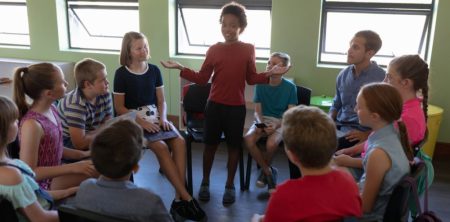Introduction
Social constructivism represents a pivotal theoretical framework in contemporary educational psychology, challenging traditional notions of learning as a solitary, individual process. At its core, this approach posits that knowledge is not simply transmitted from teacher to student, but actively constructed through social interaction, collaborative dialogue, and meaningful engagement with peers and educators. The classroom becomes more than a space of information delivery—it transforms into a dynamic ecosystem of collective meaning-making, where learning emerges through dialogue, shared experiences, and collaborative problem-solving.
The roots of social constructivism can be traced back to the seminal work of Russian psychologist Lev Vygotsky, who proposed that cognitive development is fundamentally a social and cultural process. Unlike earlier cognitive theories that viewed learning as an internal, individualistic phenomenon, Vygotsky argued that higher-order thinking skills are developed through social interactions and are deeply embedded in cultural and historical contexts.
Theoretical Foundations
Vygotsky’s Sociocultural Theory
Lev Vygotsky’s contributions to educational psychology represent the cornerstone of social constructivist thought. His most influential concept, the Zone of Proximal Development (ZPD), illustrates the critical role of social interaction in learning. The ZPD represents the gap between what a learner can accomplish independently and what they can achieve with guided assistance from a more knowledgeable other—be it a teacher, peer, or more experienced collaborator.
This theoretical framework fundamentally reimagines the learning process. Rather than viewing knowledge as a static entity to be transferred, Vygotsky conceptualized learning as a dynamic, interactive process where individuals construct understanding through dialogue, collaboration, and social negotiation. The learner is not a passive recipient of information but an active participant in knowledge creation.
Key Principles of Social Constructivism
Knowledge as Socially Constructed
Learning occurs through social interaction
Knowledge is not absolute but contextually situated
Meaning is negotiated through dialogue and shared experiences
Cultural and Historical Context
Cognitive development is embedded in cultural practices
Learning tools and strategies are culturally mediated
Individual understanding is shaped by broader social narratives
Active Learning
Learners are not passive recipients but active constructors of knowledge
Meaning-making involves critical reflection and collaborative inquiry
Learning is a process of continuous reconstruction of experience
Implementing Social Constructivism in Educational Settings
Classroom Design and Pedagogical Strategies
Translating social constructivist principles into practical classroom approaches requires a fundamental reimagining of traditional educational paradigms. Educators must create learning environments that prioritize collaboration, dialogue, and collective knowledge building.
Collaborative Learning Structures
Group Projects
Encourage complex problem-solving
Develop interpersonal and communication skills
Expose students to diverse perspectives
Peer Learning
Facilitate student-led discussions
Create opportunities for reciprocal teaching
Develop metacognitive awareness
Dialogic Instruction
Promote open-ended questioning
Encourage critical thinking
Validate multiple interpretations of knowledge
Technology and Social Constructivism
The digital age has introduced unprecedented opportunities for collaborative knowledge construction. Online platforms, collaborative software, and digital communication tools have expanded the potential for social learning beyond traditional classroom boundaries.
Digital Collaboration Tools
Learning Management Systems (LMS)
Facilitate asynchronous discussions
Enable collaborative document editing
Support multimedia knowledge sharing
Virtual Collaborative Spaces
Break geographical constraints
Promote global learning communities
Encourage cross-cultural dialogue
Social Media and Educational Platforms
Create networked learning environments
Support user-generated content
Enhance peer-to-peer learning mechanisms
Challenges and Critical Perspectives
While social constructivism offers a robust framework for understanding learning, it is not without its critiques and challenges. Implementing these principles requires navigating complex educational, psychological, and institutional dynamics.
Potential Limitations
Assessment Complexity
Traditional evaluation methods may not capture collaborative learning outcomes
Difficulty in measuring individual contributions
Need for alternative assessment strategies
Institutional Resistance
Conflict with standardized testing paradigms
Requires significant pedagogical transformation
Challenges established power dynamics in education
Equity and Accessibility
Unequal access to collaborative technologies
Potential marginalization of certain learning styles
Need for inclusive design of collaborative learning environments
Empirical Evidence and Research Insights
Psychological and Educational Research
Numerous studies have provided empirical support for social constructivist approaches, demonstrating their effectiveness across various educational contexts and disciplines.
Key Research Findings
Enhanced Cognitive Development
Improved critical thinking skills
Deeper conceptual understanding
Increased cognitive flexibility
Social and Emotional Learning
Development of interpersonal skills
Enhanced empathy and perspective-taking
Improved communication abilities
Long-term Learning Outcomes
Better knowledge retention
Increased motivation
Greater adaptability in complex learning environments
Future Directions and Emerging Trends
Interdisciplinary Integration
Social constructivism continues to evolve, intersecting with emerging fields such as neuroscience, artificial intelligence, and global education research. Future developments are likely to further refine our understanding of collaborative knowledge construction.
Promising Research Areas
Neuroscientific Perspectives
Understanding brain mechanisms in social learning
Exploring neuroplasticity in collaborative contexts
Investigating cognitive synchronization during group interactions
Global and Intercultural Learning
Developing cross-cultural collaborative frameworks
Addressing global educational challenges
Promoting inclusive and equitable learning models
Technological Innovations
Advanced adaptive learning platforms
AI-supported collaborative learning environments
Immersive and interactive educational technologies
Conclusion
Social constructivism represents more than a pedagogical approach—it is a profound philosophical reimagining of learning as a fundamentally social, dynamic, and collaborative process. By recognizing knowledge as co-constructed through meaningful interactions, educators can create transformative learning experiences that extend far beyond traditional instructional models.
The journey toward fully realizing social constructivist principles requires ongoing commitment, critical reflection, and a willingness to challenge established educational paradigms. As our understanding of learning continues to evolve, social constructivism offers a powerful lens through which we can reimagine education as a collaborative, empowering, and fundamentally human endeavor.
Key Takeaways
Learning is a social and interactive process
Knowledge is constructed, not transmitted
Collaboration is central to cognitive development
Technology offers new opportunities for social learning
Continuous adaptation and critical reflection are essential

